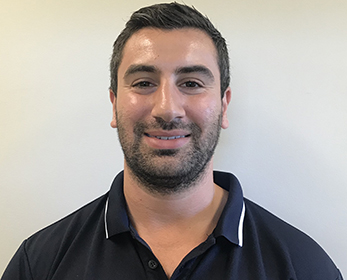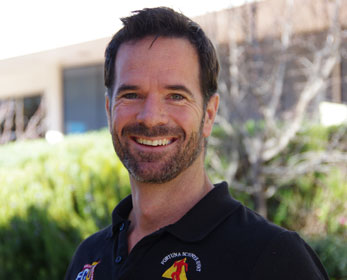This exciting initiative builds on ECU's pioneering work in myalgic encephalomyelitis / chronic fatigue syndrome (ME/CFS) research, as the two conditions appear to have significant symptom overlap.
The groundbreaking research project will be led by ECU's Dr Christopher Latella who oversees the School of Medical and Health Sciences - Neurophysiology Research Laboratory and is a Centre for Precision Health research member. The research takes place in collaboration with ECU Professors Janet Taylor, Tony Blazevich and Research Fellow Dr Kym Wansbrough.
Dr Latella's research will investigate how long COVID affects the brain and the nervous system's ability to control muscles, potentially explaining why patients experience the debilitating and persistent symptoms of fatigue and weakness.
Building on prior knowledge: unravelling long COVID
The two-part research project will use advanced, non-invasive neurophysiological techniques that measure the function of the nervous system.
"Much of what we are learning about ME/CFS informs our approach to long COVID research," Dr Latella explains.
"This new funding allows us to expand those findings and investigate whether similar differences in neural function also occur in individuals with long COVID."
Why this research is critical
Long COVID is leaving many individuals grappling with persistent fatigue, motor weakness, and reduced quality of life long after their initial infection. Yet, the precise neurological mechanisms driving these symptoms remain elusive.
Preliminary results from the team’s ongoing ME/CFS research have uncovered a reduction in the firing ability of the spinal motor nerves in those with the condition. This finding was accompanied by a 65 percent increase in the amount of effort to perform the same task as a healthy individual. Given the overlap in symptoms similar impairments may also occur in long COVID.
This research could provide valuable insights into how neural dysfunction contributes to the fatigue and motor difficulties many patients experience, paving the way for more effective diagnostic tools and potentially therapeutic targets.
A collaborative approach with Emerge Australia
The project is being conducted in partnership with Emerge Australia, a national non-for-profit organisation supporting individuals with ME/CFS and long COVID.
Participants will engage in short, single-visit sessions at ECU's Neurophysiology Research Laboratory in Perth. During these visits, they will be asked to perform brief muscle contractions of hand or ankle muscles in a seated position while neural signals are recorded. Study 1 will focus on brain function and Study 2 will focus on motor nerve activity.
Interested in participating?
The team is currently seeking participants for both studies. If you are aged 18-65, are experiencing long COVID and would like to contribute to this important research, please contact Dr Christopher Latella or Dr Kym Wansbrough or more information.
Toward better treatments and diagnostics
Dr Latella explains that this research may "help provide insight that informs future therapeutic targets and contribute to developing more objective diagnostic tools, offering hope to Australians living with the lingering effects of the pandemic."
Through this collaborative effort, ECU is taking important strides in addressing the ongoing challenges of long COVID. By unlocking the neurological mysteries behind fatigue and motor impairments, the University aims to help individuals regain their quality of life.
This project reinforces ECU's commitment to impactful research that improves lives, continuing its legacy of innovation in health and medical sciences.
Did this make you imagine a career in helping people?
Imagine a career where you're helping people to have a happier and healthier life. Now imagine the possibility of there being many such careers. Because in this study area you'll discover a variety of courses to help you start a rewarding career as a professional in health-related industries. Check out ECU Medical & Health Science courses.

 New funding is helping ECU researchers unlock the neurological mysteries behind fatigue and motor impairments to help individuals with long COVID regain their quality of life.
New funding is helping ECU researchers unlock the neurological mysteries behind fatigue and motor impairments to help individuals with long COVID regain their quality of life.





